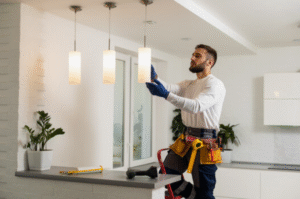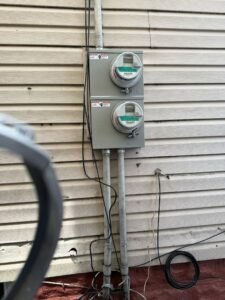When it comes to your home’s electrical system, electrical wiring installation is one of the most critical aspects. Whether you’re building a new home, renovating, or upgrading an outdated system, proper wiring ensures your electrical appliances and devices function safely and efficiently. Faulty wiring is not just an inconvenience—it can be a serious safety hazard.
In this article, we’ll cover everything you need to know about electrical wiring installation, why hiring a professional is essential, and what to expect from modern electrical setups in 2024.
Why Is Proper Electrical Wiring Important?
You might not think about it much, but the wiring in your home is what powers everything from your refrigerator to your internet router. If the wiring is done incorrectly, it can lead to various issues such as frequent electrical surges, tripping breakers, and, worst of all, electrical fires.
Electrical wiring installation plays a huge role in ensuring:
- Safety: Correctly installed wiring reduces the risk of fire and electrical shock.
- Efficiency: Modern wiring can handle the power demands of today’s devices.
- Longevity: High-quality wiring lasts longer and reduces the need for frequent repairs.
Types of Electrical Wiring
Before you jump into a wiring project, it’s important to understand the different types of electrical wiring available. Depending on your home’s needs, the right wiring can make a huge difference in performance and safety. For more information Click Here
1. Non-Metallic Sheathed Cable (NM)
This is the most common type of wiring used in homes today. It’s affordable and easy to install, making it ideal for most standard residential applications.
2. Armored Cable (AC)
AC wiring is typically used in commercial or industrial settings, though it can be useful for residential applications where additional protection is needed. The metal casing provides extra durability.
3. Underground Feeder (UF)
If you need wiring for outdoor use or for buried lines, UF cable is essential. It’s specially designed to withstand moisture, making it ideal for outdoor lighting or pools.
4. Coaxial Cable
For homes that rely on strong television or internet connections, coaxial cable is often used alongside electrical wiring installation. It provides high-quality signal transmission.
Signs You Need New Electrical Wiring
How do you know if it’s time for a wiring upgrade? Here are some common signs that your home might need new electrical wiring installation
1. Flickering Lights
If your lights flicker or dim when you use certain appliances, it could be a sign of faulty or overloaded wiring.
2. Tripping Circuit Breakers
Circuit breakers are designed to shut off when there’s an overload. If yours are tripping regularly, it might be time to look at the wiring.
3. Warm Outlets or Switches
Outlets and switches that feel warm to the touch could be a sign of an electrical problem that needs immediate attention.
4. Old Wiring
Homes built before the 1970s often have outdated aluminum wiring, which is not as safe as modern copper wiring. If you live in an older home, consider a full electrical wiring upgrade.
Steps Involved in Electrical Wiring Installation
When it comes to General repairs, there’s a process to follow to ensure everything is done correctly and safely. While the exact steps can vary depending on your home’s needs, here’s a basic breakdown of what to expect.
1. Planning and Designing
The first step is to plan where all the outlets, switches, and major appliances will be located. This ensures that the wiring will be laid out efficiently, avoiding the need for future adjustments. Electricians will also assess the power load requirements for your home.
2. Wiring Installation
Next, the electrician will install the wiring, running it through the walls and ceilings to connect to all the necessary outlets and switches. They’ll also install circuit breakers and the main electrical panel to ensure your home’s power is evenly distributed.
3. Testing and Inspection
Once the wiring is installed, it’s time to test everything to make sure it’s working properly. Electricians will also check for any safety hazards and ensure that the wiring is up to code.
4. Finishing Up
After testing, the final step is to finish up the installation by connecting all the outlets, switches, and light fixtures. Everything is neatly secured, and your electrical system is ready to go!
DIY vs. Professional Electrical Wiring Installation
It might be tempting to try your hand at electrical work, especially if you’re a DIY enthusiast. However, electrical wiring is one area where it’s almost always better to call a professional. Here’s why:
1. Safety Concerns
Electrical wiring installation is complex and dangerous. One wrong move could result in injury, fire, or severe damage to your property.
2. Code Compliance
Licensed electricians know the local codes and regulations that need to be followed. This ensures that your home is safe and that you won’t run into any issues when selling the property in the future.
3. Long-Term Savings
While hiring a professional may cost more upfront, it can save you a lot of money down the road. Faulty DIY wiring can lead to expensive repairs or increased energy bills due to inefficiencies.
Energy Efficiency: The Future of Electrical Wiring
In 2024, energy-efficient homes are more important than ever. With the rise of smart homes, renewable energy, and electric vehicles, the demand for electrical wiring installation that can handle modern power loads is growing.
1. Smart Home Integration
Today’s homes are more connected than ever. Electricians now install wiring that can support smart devices, from lighting systems to security cameras. These systems help save energy by offering greater control over your home’s power usage.
2. Solar Power Wiring
With more homes opting for solar energy, electricians are increasingly called upon to install wiring that can support solar panels and battery storage systems.
3. Electric Vehicle (EV) Charging Stations
As EVs become more popular, having the proper wiring for home charging stations is essential. Many homeowners are upgrading their electrical systems to support fast, efficient EV charging.
Conclusion: Invest in Professional Electrical Wiring Installation
Whether you’re building a new home or upgrading an existing one, professional best electriciann in brooklyn is essential for safety, efficiency, and peace of mind. Avoid the risks of DIY electrical work, and trust licensed electricians to handle your home’s wiring needs.
By ensuring your electrical system is up to code and energy-efficient, you’ll not only save on future repairs but also improve the overall value and functionality of your home. Ready to upgrade your home’s electrical system? Contact a professional today to get started!



